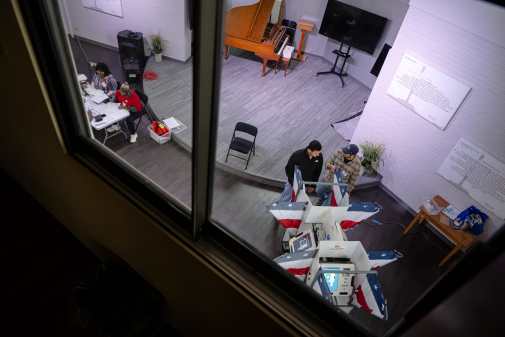Election offices are preparing for a smooth voting process — and angry voters

Roughly a month out from Election Day, officials from across the country said they remain focused on carrying out a smooth voting process while bracing for the possibility that their offices could be overwhelmed by angry voters and false claims of election fraud.
Speaking at a gathering in Washington D.C. hosted by the Partnership for Large Election Jurisdictions, a bipartisan group of election officials said that while they remain steadfastly confident in the integrity of past elections, they have had to put in place a host of new procedures over the past few years specifically to deal with claims of election malfeasance and fraud from local voters convinced by false claims of vote rigging by Republican candidate Donald Trump and his allies.
“The temperature never really came down for election staff after 2020, and so we are better prepared than we ever have been,” said Amanda Gonzalez, county clerk for Jefferson County, Colo.
Gonzalez said the spread of accurate and timely information is crucial to defusing disinformation campaigns, but in an environment where even state and local election officials face constant threats and harassment, getting that information from a family member or friend may be more effective.
One of her first initiatives after coming into office in 2023 was setting up an advisory board made up of residents to exchange information on elections and address questions, concerns and rumors. The members range from teenagers to retirees and includes “some folks that post some really questionable things on Facebook.”
“I think I’m delightful, but I might not always be the best messenger for all of this information, and so the real question is how can we bring more people in to get accurate information out?” she said.
Most officials have said the best antidote to conspiracy theories is transparency around how votes are counted and the multiple layers of procedures in place to prevent fraud, noncitizen voting and other malfeasance.
But not everyone can be convinced, and officials also described dealing with shrinking staffs and waves of retirements from people who don’t want to put up with constant harassment from voters. One official compared the flood of public records requests to a denial-of-service attack, paralyzing employees and preventing them from performing their duties.
Katharine Clark, clerk for Santa Fe County, N.M., said that in addition to hosting de-escalation training, her office set up a shared online chatroom between election officials and local law enforcement to coordinate and respond to threats in real time. For the general election, they’ve hired additional security and purchased personal alert devices for presiding judges.
Though foreign hacking is still part of their threat model, most officials are focused on handling hostile or threatening voters who are misled by false claims about election integrity and fraud prevention.
The suspicions have created an environment where election officials feel there is no margin for error and even innocent mistakes or oversights are immediately pounced on by election denialists as proof of corruption.
Just as federal officials have at times outsourced communications around accurate voting procedures to state and local officials while arguing they are often more trusted by local communities, some state and local officials have taken a similar approach.
Gonzalez’s office is hiring a full-time employee for community outreach who travels year-round to high schools and community fairs, as well as less traditional locations like “laundromats and pizza shops and cannabis dispensaries” to spread accurate information about elections and address questions from the public.
“If you email me with a question about something that you saw on social media that you’re concerned about, we invite you in,” she said. “Come see for yourself what the process is like, because we know that amount of transparency is going to inspire trust in our elections.”
In some ways, the need to constantly prove that elections aren’t being marred by fraud has led to tighter processes and increased vigilance. A popular claim from election skeptics has been that voter registration rolls are poorly maintained or packed with noncitizens who aren’t eligible to vote.
Zach Manifold, election supervisor for Gwinnett County, Ga., said that whereas 10 years ago he might have done periodic maintenance of voter lists and sent out mailers to residents to confirm their voting eligibility once every other year, they have already checked their rolls five times during this election cycle.
In conversations with other election officials this year, “everybody agreed that their voter rolls are more accurate today than they’ve ever been,” Manifold said.
Countering false or unproven election claims also depends on the communication style with skeptics, sometimes as much as the message’s substance. Despite extensive research and news stories on foreign-led disinformation, finding the best ways to combat it remains challenging.
The Center for an Informed Public, a research institution at the University of Washington, has long opted to use the phrase “rumors” when describing many of the viral claims that can spread around elections. Danielle Lee Tomson, a research manager at the center, told CyberScoop that while there are instances where terms like “disinformation” or “misinformation” can be accurate, their usage after the 2016 election cycle may make target audiences more defensive than receptive.
The term “rumors” accounts for “the human need to make sense of uncertainty, and it doesn’t have this sort of normative [judgment] of, ‘Oh, you’re sharing wrong information and you didn’t know. How dare you,’” Tomson said. “It sort of alleviates some of that judgment and takes a more sympathetic approach to why we share these things and often offers up some analytic tools that the frames of mis- and disinformation don’t necessarily have.”
Human beings naturally rely on word-of-mouth for information in the face of uncertainty, even on complex subjects like election administration. Using language that recognizes both the value and pitfalls of that behavior is one way the center tries to overcome stigmatization barriers.
“Sometimes a rumor might be true, like maybe a polling location really did shut down because of a flood. … Sometimes they’re blatantly false,” Tomson said. “But most of the time, rumors are somewhere in between, or they’re in the process of being resolved, and that helps us understand the genesis and spread of information as opposed to judging the nature of that information itself.”






